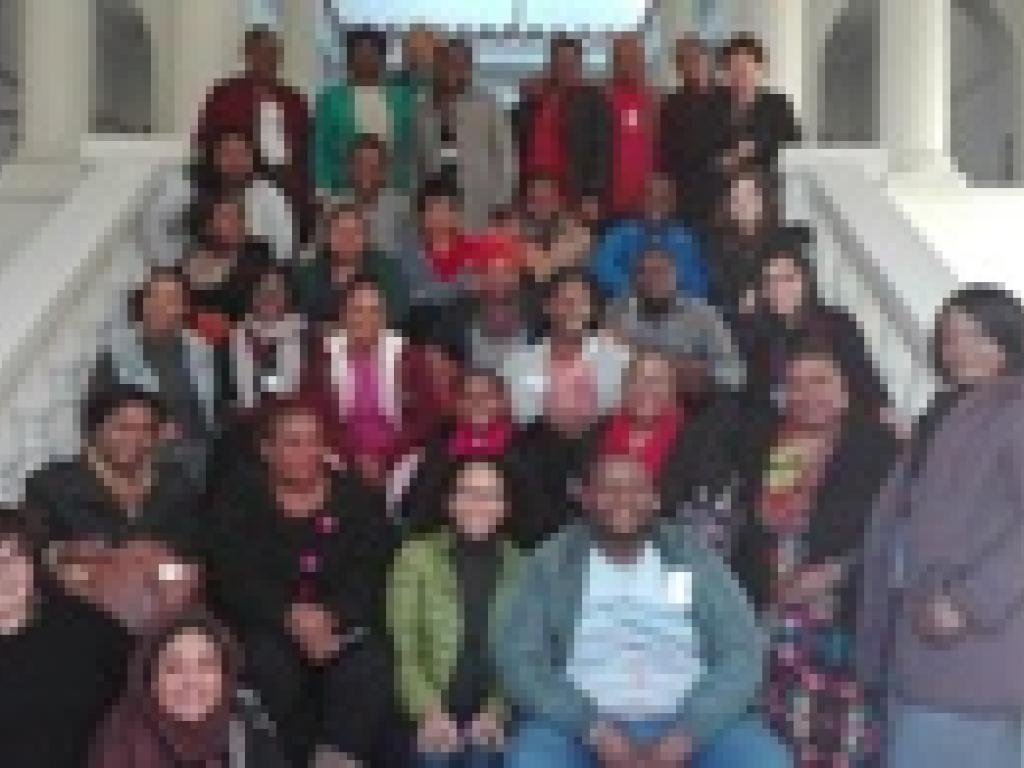Prioritising our Youth: The Adolescent & Youth Health Policy Short Course

With the release of the 2017 National Adolescent & Youth Health Policy, the South African government and partners have committed to prioritise meeting the health needs of the country’s youth in supporting and assisting them as they transition from childhood to adulthood. Key to policy implementation, however, is ensuring that staff involved with adolescent healthcare and well-being have the necessary capacity to implement policy programmes.
This goal was given a major boost through the recent introduction of a short course for government and non-governmental organisation support staff, working at national, provincial and district levels, to implement the policy that targets young people aged 10 – 24 years. The course, which is offered by the Desmond Tutu HIV Centre in UCT’s Health Sciences Faculty, is based on a short course run annually, for the past nine years in London, by the London School of Hygiene & Tropical Medicine and the World Health Organisation (WHO).
In September 2018, the Desmond Tutu HIV Centre (DTHC) with the support of the Department of Health welcomed 30 participants to the second Adolescent & Youth Health Policy Short Course in Cape Town. The DTHC is an accredited research grouping within the University of Cape Town and is supported in its work by the Desmond Tutu HIV Foundation. The UCT-accredited course aims to build and strengthen the capacity of those professionals responsible for managing the implementation of the National Adolescent & Youth Health Policy (and related policies and health strategies) through improved knowledge on adolescence and their key health problems, how best to implement and monitor adolescent programmes, how to involve adolescents in programmes and social protection, to name a few.
“This course is the first of its kind and has been very well received by participants”, explains Dr. Nadia Ahmed, adolescent clinical lead and HIV and sexual health physician. “Adolescents are a unique group that need champions to support furthering their healthcare and general well-being. The course gives professionals the platform to develop their learning in everything from HIV and mental health to programming and monitoring to social media. It has been very well received and we can already see the impact it is making for adolescents in South Africa.”
The course participants were selected from 89 applications from across South Africa, including those who implement and conceptualise adolescent programmes as managers, curriculum and programme specialists. Participants came from both non-profit and government sectors, with the Department of Basic Education and the Department of Health (provincial and district) represented as part of this year’s cohort. Additionally, four selected participants from Zimbabwe and Zambia were invited to attend with the intention to adapt the course to run in these countries in 2019.
Prof. Linda Gail-Bekker, the deputy-director of the Desmond Tutu HIV Foundation and UCT Professor of Medicine, says "the course participants represented the best of their kind who are responsible for implementing the Adolescent & Youth Health Policy nationwide and making an impact in the lives of adolescents in South Africa and beyond”.
The course was funded by Viiv Healthcare Positive Action for Adolescents and run in conjunction with the London School of Hygiene & Tropical Medicine (LSHTM). Based on the Adolescent Health in Low and Middle-Income Countries Short Course of the LSHTM and the WHO, the content was adapted to the South African context as a pilot, and ran for the first time in 2017 in partnership with the DTHC, UCT; Reproductive Health & HIV Institute, University of Witwatersrand; United Nations Population Fund East and Southern Africa Regional Office; and the Africa Health Research Institute.
This year, the short course curriculum was further developed to include a session on comprehensive sexuality education, delivered by a senior official from the Department of Basic Education, and a session that covered the importance of social media in relation to youth as well as using social media within adolescent programmes.
Unique to the curriculum is a half-day tour to five adolescent-focused sites in Cape Town, which this year included CeaseFire, Gold Youth, Grassroots Soccer, the Desmond Tutu HIV Foundation Youth Centre and the Tutu Teen Truck Mobile Clinic.
The five-day course also included interactive sessions led by experts from the AIDS and Society Research Unit and Department of Sociology; the Alcohol, Tobacco and Other Drug Research Unit of the South African Medical Research Council, and United Nations Population Fund.
The curriculum provides for a course assignment in which participants are expected to share their learnings from the course with their own organisation and to undertake a project to further adolescent healthcare by applying what they have learnt from the course. Examples from the 2018 course include creating a youth-friendly space within a research clinic and setting up a youth advisory panel for the National Department of Health. Each participant has a mentor from the faculty of the short course for their project.
The course is set to continue in 2019 with the continued support from Viiv Healthcare Positive Action for Adolescents, the LSHTM, the government and other partners. While it targets those professionals key to managing the Adolescent & Youth Health Policy (and related policies and strategies such as the Integrated School Health Policy, Department of Basic Education National policy on HIV, TB and STIs) at national and provincial levels, the course will also benefit other applicants.
These include those who have ‘adolescent’ in their job description, senior staff in regional training centres responsible for designing training programmes for staff who are implementing adolescent health policies and programmes; researchers and academics; professional training institutes; and professional regulatory bodies assisting with adolescent programmes.
For more information and how to apply, email Adol.ShortCourse@hiv-research.org.za.
Article by Farhaanah Fortune and Dr. Nadia Ahmed, Desmond Tutu HIV Centre, based at UCT's Health Sciences Faculty, November 2018.